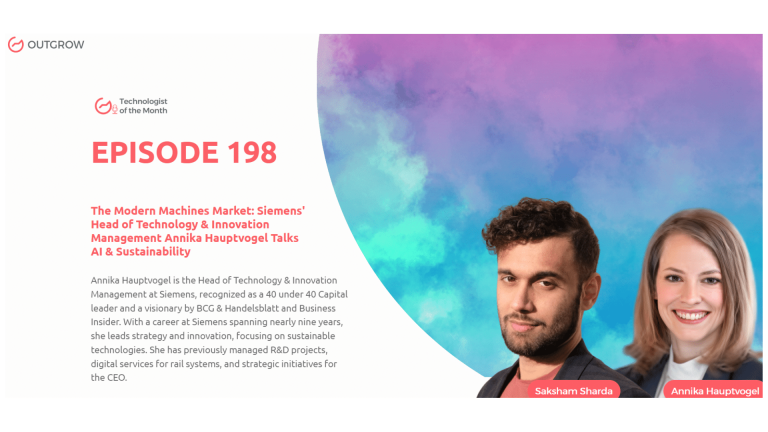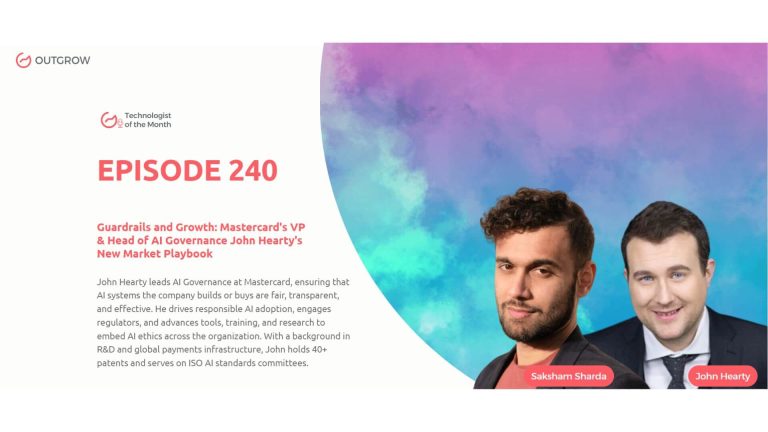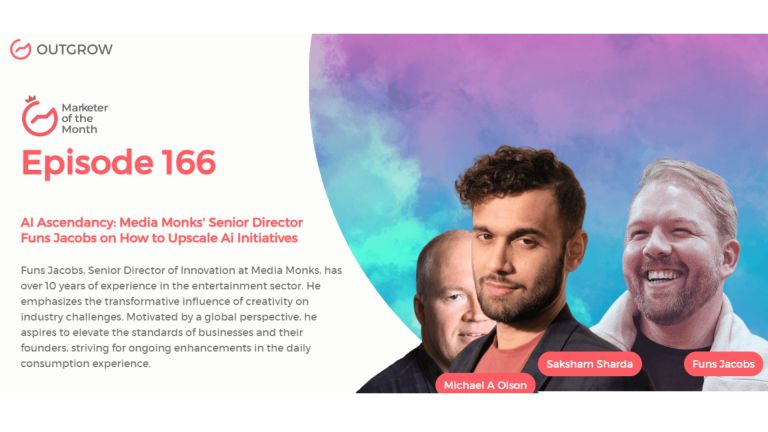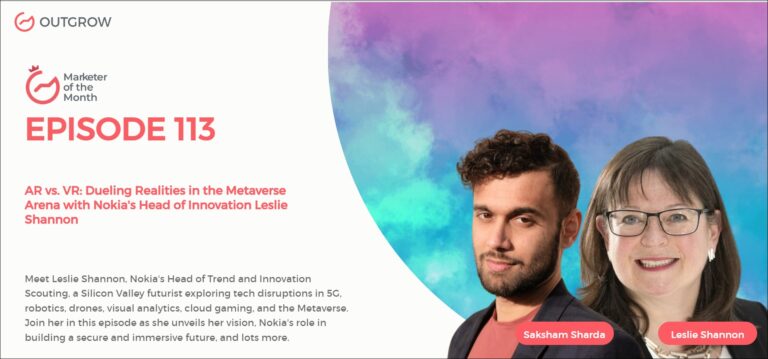Summarize with :
EPISODE 230: Marketer of the Month Podcast with Eric Tak
Table of Contents
Hey there! Welcome to the Marketer Of The Month blog!
We recently interviewed Eric Tak for our monthly podcast – ‘Marketer of the Month’! We had some amazing insightful conversations with Eric and here’s what we discussed about-
1. Preserving cash benefits while enabling remote digital transactions.
2. Offline payment functionality using token-based NFC technology solutions.
3. Consumer adoption incentives beyond the current payment method satisfaction.
4. Non-programmable money approach despite social media speculation buzz.
5. Stablecoin differences, central bank backing versus private money.
6. Innovation competition strategy, the private sector is building on the ECB platform.
7. European payment sovereignty and universal accessibility mission goals.
About our host:
Dr. Saksham Sharda is the Chief Information Officer at Outgrow.co He specializes in data collection, analysis, filtering, and transfer by means of widgets and applets. Interactive, cultural, and trending widgets designed by him have been featured on TrendHunter, Alibaba, ProductHunt, New York Marketing Association, FactoryBerlin, Digimarcon Silicon Valley, and at The European Affiliate Summit.
About our guest:
Eric Tak has headed the ECB’s Product Proposition Division of the Directorate Digital Euro since June 2024. He is responsible for managing the design and refinement of the digital euro product proposition, including the distribution model via payment service providers, liaising closely with internal and external stakeholders.
Cash Me If You Can: European Central Bank’s Digital Euro HoD Erik Tak Explains Border-Free Wallets
The Intro!
Saksham Sharda: Hi, everyone. Welcome to another episode of Outgrow’s Marketer of the Month. I’m your host, Dr. Saksham Sharda, and I’m the creative director at Outgrow. co. And for this month we are going to interview Eric Tak, who is the Head of Division, Digital Euro – Product Proposition at European Central Bank.
Eric Tak: Great to be here. Thank you.
Don’t have time to read? No problem, just watch the Podcast!
Challenge yourself with this trivia about the exciting topics Eric Tak covered in the podcast.
Or you can just listen to it on Spotify!
The Rapid Fire Round!
Saksham Sharda: Alright, so let’s start with the rapid fire rounds to break the ice. The first question is, at what age do you want to retire?
Eric Tak: At 70.
Saksham Sharda: How long does it take you to get ready in the mornings?
Eric Tak: 25 minutes.
Saksham Sharda: Most embarrassing moment of your life?
Eric Tak: Yet to happen.
Saksham Sharda: Favorite color?
Eric Tak: Blue.
Saksham Sharda: What time of day are you most inspired?
Eric Tak: End of the morning.
Saksham Sharda: How many hours of sleep can you survive on?
Eric Tak: Six.
Saksham Sharda: The city in which the best kiss of your life happened?
Eric Tak: Amsterdam.
Saksham Sharda: Pick one. Mark Zuckerberg or Sam Altman?
Eric Tak: Sam Altman.
Saksham Sharda: How do you relax?
Eric Tak: Too little.
Saksham Sharda: How many cups of coffee do you drink per day?
Eric Tak: Two big ones.
Saksham Sharda: A habit of yours that you dislike?
Eric Tak: Strolling too much on my phone.
Saksham Sharda: The most valuable skill you’ve learned in life.
Eric Tak: Letting go.
Saksham Sharda: Are you an early riser or a night owl?
Eric Tak: Night owl.
Saksham Sharda: One-word description of your leadership style?
Eric Tak: Empowering.
Saksham Sharda: Coffee or tea to kickstart your day?
Eric Tak: Coffee.
Saksham Sharda: Top priority in your daily schedule?
Eric Tak: Making time to think.
Saksham Sharda: Ideal vacation spot for relaxation?
Eric Tak: Somewhere where I can do a lot of stuff. Preferably skiing in the Alps.
The Big Questions!
Saksham Sharda: Alright, so that was the end of the rapid fire. Now we’re gonna go on to the longer questions, and you can answer as much time and ease as you’d like. The first one is, why would Europeans need the digital euro?
Eric Tak: Well, we’ve always had central bank money. All the stuff with debit cards, credit cards, and all the payment forms is from much later. When we talk to consumers and when we survey them, they like a lot of things about cash today, the central bank money, which is the fact that it’s available to everyone and accepted everywhere, the fact that it has high privacy or even anonymity, the fact that it’s a fallback in case of card outages, but it has one drawback. It didn’t really develop with time. I can only give money to you if we’re right in front of each other or next to each other. I can’t buy anything online with cash. Hence, we want to preserve all those good things that cash has, but bring it into the digital age, making it available to remote peer-to-peer, e-commerce transactions, as well as buying things in physical stores.
Saksham Sharda: And how exactly would the digital Euro look?
Eric Tak: A digital Euro would be a separate balance and a service that is distributed to you through your bank or through another financial institution where you could put money on, like maybe in a PayPal account, and that you can use to pay with the digital Euro, and you can fund it either directly in the transaction, you can fund it upfront, or you can have a regular funding onto the account. It could be an app on your phone. It could be in the mobile banking app of your current bank, or it could even be, for those who are less digitally savvy, a physical card.
Saksham Sharda: And how would offline payments function if someone doesn’t have internet connectivity?
Eric Tak: Yes, so even today, we can pay without internet connectivity from the consumer, but the merchant needs to be online for authorisation. The offline digital Euro, which, for the more technically orientated people, is a token-based solution, basically allows us to exchange tokens from one smartphone or terminal to another through NFC without the interference necessary from any online checking.
Saksham Sharda: Why would people want to use this digital Euro?
Eric Tak: That’s always the most important question. When we do research, we did the space research at the ECB, and we see that a lot of people currently say they have limited problems when paying. However, we do see there are pockets where there are currently issues. People who don’t have a modern smartphone, or don’t want to use a smartphone, or are not able to use a smartphone very often, struggle to pay digitally. We want to solve that. There are people who have concerns, and that’s the biggest concern people have about payment. More than 50% have concerns about their privacy when paying digitally. And we want to offer the opportunity to not only have the really high privacy, the highest possible privacy in the online digital Euro, but even cash-like anonymity in the offline digital Euro. And we’ve been getting a lot of requests from the consumer representatives for people who have payments that would reveal a lot about their gender, their sexual preferences, their religious affiliations or political affiliations, to be able to do those payments in such a way that they can never be stored, retrieved or seen by anyone else.
Saksham Sharda: What incentives might encourage early adoption among consumers who are already satisfied with current payment methods?
Eric Tak: Well, first of all, it’s something that the merchants need to see the advantage of. Obviously, all merchants that accept the digital Euro, which if the digital Euro regulation is adopted, will be a mandatory thing to accept it, can suddenly accept consumers from the whole of Europe that would be able to pay, and not like in some cases still today that you only accept a domestic brand. Also, consumers could safely travel everywhere without having to worry about physical cash because they know the digital Euro will be accepted everywhere in Europe.
Saksham Sharda: So, will the digital euro be replacing cash?
Eric Tak: We’ll keep cash alive for as long as there’s a demand for it. But due to the limitations of cash, we have seen a decline over the past few years, with an acceleration of the decline during COVID. While we will make sure that cash will remain available, we will, as a complementary solution, also have this digital form of cash.
Saksham Sharda: And is there any timeline for this transition? And would there be a phase-out period for physical cash?
Eric Tak: No, there won’t be a phase-out period for physical cash. It will remain as long as there’s any demand for it. Phasing in the digital Euro requires, as I mentioned before, first of all, a regulation for that that grants it legal tender status in Brussels between the co-legislators. Once that has happened, we can launch roughly about two and a half years later because all of the banks and the distributors, and the merchants need to build services to be able to accept and distribute it.
Saksham Sharda: Who would have access to people’s payment data?
Eric Tak: So, certainly not the European Central Bank or the Euro system. We would only know about account numbers and transactions associated with account numbers, but we would have no idea who that account belongs to. The only party that knows who that account belongs to is the distributor, typically a bank or a payment institution that is regulated. In that sense, similar to how it works today with, for instance, domestic card schemes. So we wouldn’t know anything.
Saksham Sharda: And how would cross-border transactions be handled in terms of data sharing between different European jurisdictions?
Eric Tak: So, to a large extent, we don’t have any problem sharing data of this kind within the European Union and the Eurozone. We will focus on that initially. We are not currently considering if we can also use the digital Euro if it’s widely adopted in stores in the USA, if you’re travelling there or in the UK. Or if we’ll open it up to visitors in Europe, coming from those countries, being able to pay with it. So until that time, there will always be data which are sovereign European data.
Saksham Sharda: And would the digital Euro pose a threat to financial stability by disintermediating banks?
Eric Tak: We don’t believe so for a number of reasons. People will not put all of their money in the digital Euro account. First of all, there is an expectation that there will be a holding limit, the maximum amount that you could put on your digital Euro account. Secondly, there will not be any interest paid on the digital Euro account. And thirdly, through the real-time funding option that we’re building into the digital Euro, there’s no need to put money in your digital Euro account if you don’t want to. And let’s be honest, a lot of people, just before salary payments come in, can’t even afford to have money spread out over different accounts anyway.
Saksham Sharda: Would the digital Euro be programmable money?
Eric Tak: No, it wouldn’t. There’s a lot of buzz from a small but noisy group on social media that expects programmability. This is not on our agenda. It’s not even possible the way that we do it. There might be solutions built on top of the digital Euro that could make payments conditional. For instance, for use cases like the merchant only gets paid when the consumer identifies that the goods have been received, for instance. Or programmability beyond that is not foreseen and not expected.
Saksham Sharda: So, how would the digital Euro be different from stable coins and crypto assets?
Eric Tak: Well, from crypto assets, it would be completely different because it’s central bank money, which has a stable value only influenced by inflation, which is also managed by us to the extent that we can. Stablecoins, again, are private money backed by, well, not even fiat money in most cases, but actually government debt, which to me has some potential interesting use cases, more on the corporate side in treasury for cross-border payments outside the Eurozone. So we believe they serve different purposes.
Saksham Sharda: How do you plan to compete with the innovation speed of private cryptocurrency projects?
Eric Tak: The private crypto I don’t see really taking off in retail payments for now. For sure, a central bank will never be the most innovative party to play in a field like this, which is why we expect that the private sector can innovate on top of the digital Euro. The digital Euro will be a platform of basic payment forms on top of which financial services parties, licensed parties in the ecosystem, can either innovate on top of that platform or in their own private sector schemes.
Saksham Sharda: Where does the digital Euro project currently stand, and what are the next steps?
Eric Tak: So we’re currently wrapping up three different things. One is finalising the 0.9 version of the rulebook for the digital Euro so that we can consult it with our rulebook development group, which has all the stakeholders in the market represented. We are completing the sourcing of five core components to build the digital Euro, which we’re sourcing externally with external parties. And we are preparing for the next phase that we will propose to the governing council of the Euro system and the ECB towards the end of October.
Saksham Sharda: What are the biggest technical or regulatory hurdles that could delay these timelines?
Eric Tak: Well, as I mentioned before, in order to launch a digital Euro, there will have to be a digital Euro regulation, which, amongst others, gives it legal tender status, which provides a compensation model, which outlines the liabilities between the players in the field. And we cannot do anything before that regulation is adopted. That’s more on the regulatory side. On the technical side, I think that we can solve most of the problems. The most challenging one, because it’s not been done before, is the offline digital Euro, which requires not only access to NFC, but also access to secure elements in phones, which have to be arranged with the OEMs in the markets, and which also covers questions that currently not even all smartphones have secure elements embedded in them. And because we won’t be able to track individual transactions, we have to be ultra careful that nobody can make new tokens, new offline digital Euros, without us noticing. So that requires a lot of thinking and developing. We will be working with a third party also on that particular part.
Saksham Sharda: What are the primary objectives of the digital Euro project? And what role will it play for the future of European payments?
Eric Tak: So first of all, it’s a complementary means of payment, just like physical cash is today, to other private sector means of payment. It is supposed to strengthen the European sovereignty in payments, to provide additional resilience in payments, in case a private sector solution suddenly doesn’t work for one reason or the other, to maintain the access for all citizens to use central bank money to pay in all use cases imaginable, and to maintain access to these kind of solutions for everyone. A lot of the current new solutions are digital only and will only be distributed through smartphones. We will make sure that people, even without a bank account or without a modern smartphone, can use the digital Euro.
Saksham Sharda: So the last question for you is a personal kind. What would you be doing in your life if not this?
Eric Tak: I don’t really know. I’m really happy I’m here. I’ve worked in payments for over 30 years, mostly in the private sector, and I definitely wanted to do something that I had not done before. And this is certainly something that’s not been done before, and also something where I feel I’m contributing to something bigger than just a successful product.
Let’s Conclude!
Saksham Sharda: Thanks, everyone for joining us for this month’s episode of Outgrow’s Marketer of the Month. That was Eric Tak, who is the Head of Division, Digital Euro – Product Proposition at European Central Bank.
Eric Tak: Great to be here. Thank you.
Saksham Sharda: Check out the website for more details and we’ll see you once again next month with another marketer of the month.

Muskan is a Marketing Analyst at Outgrow. She is working on multiple areas of marketing. On her days off though, she loves exploring new cafes, drinking coffee, and catching up with friends.









